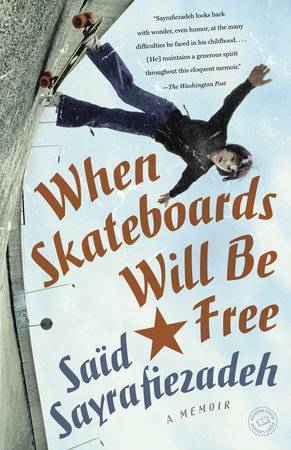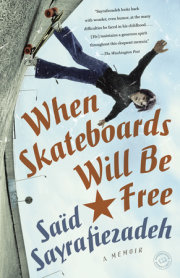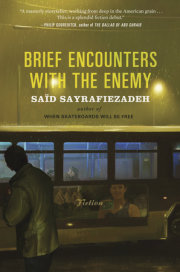Chapter OneMy father believes that the United States is destined one day to be engulfed in a socialist revolution. All revolutions are bloody, he says, but this one will be the bloodiest of them all. The working class–which includes me–will at some point in the not-so-distant future decide to put down the tools of our trade, pour into the streets, beat the police into submission, take over the means of production, and usher in a new epoch–the
final epoch–of peace and equality. This revolution is not only inevitable, it is imminent. It is not only imminent, it is
quite imminent. And when the time comes, my father will lead it.
Because of such urgency I do not see my father very often. This despite the fact we both live in New York City. Weeks pass. Months pass. Then a year. At times I will begin to wonder if I will ever hear from him again, but just as I do, a postcard will arrive from Istanbul, or Tehran, or Athens, or Minneapolis, where he has gone to attend this or that conference or to deliver this or that speech. “The weather is beautiful here,” he will write in enormous swirling optimistic cursive that fi lls the white space, leaving room to say nothing more. We’ve had our moments, though, over the years. My eighteenth birthday–the fi rst time we had been together for any of my birthdays–my father astounded me by giving me a Walkman, by far the most expensive present I’d ever received. Then for my nineteenth birthday I stayed an entire week with him and his wife–his second wife–taking photographs, watching movies on the VCR, and playing Scrabble late into the night, where, even though my father is Iranian and English is his third language, he beat me nearly every time. We also took a long walk one Sunday afternoon, just him and me, to the aquarium at Coney Island, sitting side by side in the winter air while we watched as a walrus swam back and forth in its cement pond. Later at the café I was so nervous about being on my best behavior that I knocked over an entire cup of coffee onto his lap. “Sorry, Pop. Sorry. Sorry. Sorry.” And every Sunday morning during my freshman year in college he would call to ask if he could help answer any questions I might be having with Algebra 101. He is a professor of mathematics, after all.
But first and foremost my father is a member–a
comrade–of the Socialist Workers Party. He is a leading comrade, in fact, and has been for almost all my life. The responsibilities he chooses to undertake include, but are not limited to, editing books, writing articles, giving speeches, teaching political classes, attending book sales, demonstrations, rallies, meetings, conferences, picket lines . . . By the time I was in my early twenties my father had again begun to disappear behind this massive workload of revolution, and his phone calls grew increasingly infrequent until they ceased altogether, and our joyful reunions became more like occasional punctuation marks in long paragraphs of silence.
One summer night, when I was twenty- seven years old, I took my girlfriend to Film Forum in the West Village to watch a documentary on Che Guevara. When the movie was over, I came out of the theater to see my father standing on the sidewalk behind a table with an array of books published by Pathfi nder Press, the publishing house of the Socialist Workers Party.
Che Guevara Speaks. Che Guevara Talks to Young People. The History of the Russian Revolution. Imperialism: The Highest Stage of Capitalism. A handwritten banner was draped over the front of the table with a quote by Castro that read “There will be a victorious revolution in the United States before there will be a victorious counterrevolution in Cuba.” In my father’s hand, displayed for all to see, was that week’s issue of
The Militant.
“Sidsky!” my father called out, using his invented Russified diminutive of my name, which has never failed to endear him to me.
“Pop!” I said.
“How was the movie, Sidsky?”
“I liked it,” I said.
And my girlfriend, who cared little for politics and had never even heard of Che Guevara before I had told her about him, said, “I liked it too.”
“I see,” my father said, looking fi rst at my girlfriend and then at me. It was obvious by the expression on his face that we had given the wrong answer. I thought of backtracking and adding qualifi cations to my opinion, but before I could think what those qualifi cations could be, he said, “Let’s have dinner tonight. What do you say? There’s a nice restaurant right around the corner.”
I agreed, of course, wholeheartedly. The only hitch was that my father had to wait for the next showing of the documentary to let out, ninety minutes from now, and then he had to put all the unsold books away and fold up the table, so my girlfriend and I walked fourteen blocks through the West Village to my studio apartment to sit patiently by the phone, growing hungrier by the minute. And when my father fi nally called it was to say, sorry, a last- minute meeting had suddenly been scheduled, he could not see us tonight, but we would defi nitely do it again sometime soon, he promised, the three of us, soon.
“Oh, I can tell you’re disappointed!” my girlfriend said, throwing her arms around me, kissing me.
“No, I’m not,” I said, but I was.
And then the phone rang again, and it was my father again, but this time he was saying that the last- minute meeting had just been rescheduled, and, yes, he could have dinner now, right now, he was excited to see us, how soon could we be there? So my girlfriend and I hurried the fourteen blocks back through the Village to meet him at the nice restaurant around the corner from Film Forum, where we ate and drank our fi ll while he explained to us everything we had misunderstood about the movie.
Not long after that, I began to have feelings of claustrophobia around my girlfriend. We had been together for just one year, but all the excitement had worn away. I cringed at her affection. When she would ask if I had missed her after a few days apart, I would cruelly delight in telling her I had not. I broke up with her fi nally in front of Monet’s
Water Lilies at the Museum of Modern Art for what was supposed to be the beginning of a fun- fi lled weekend at her parents’ house in upstate New York. And my father, almost about the same time, divorced his second wife of ten years. But while I remained single, unable to summon the courage to ask anyone out, sitting alone in the front row of Film Forum every weekend with regret, he had begun to date with gusto, beginning with a twenty-eight-year-old comrade from the party. When I saw him next, it was in his new apartment in Brooklyn, shabby and unpainted, but I knew he didn’t care. The apartment had a hollow, empty, unlived- in feel, like he was just moving in or just moving out. The reality was that he had already been there six months. There was hardly anything in the place except for a large desk in the living room littered with memorandums from the Socialist Workers Party. And next to the desk was a plant about to die. Next to the plant were two bookcases. One fi lled with forty- five volumes of the collected works of Lenin, including letters to relatives. And the second with forty-nine volumes of the collected works of Marx and Engels, also with letters to relatives. These had been given to him by his second wife one Christmas when times were still good. I remembered that Christmas. I had been there for it. Standing in the dim light next to the dying plant, I wondered if he had had the chance yet to read every volume. I wondered if I should read every volume.
My father abandoned me when I was nine months old, and with only a few exceptions I did not see or hear from him for eighteen years. “Mahmoud went off to fi ght for a world socialist revolution,” my mother would tell me with proud determination when I was a little boy.
Mahmoud. The name always sounded so ornate, so exotic, coming from my mother’s mouth, and it emphasized the fact that my name was also exotic, while my mother was Martha Harris (née Finkelstein), a Jewish American, born and raised in the small town of Mount Vernon, New York. The divisons and allegiances, therefore, were various.
In any event, the logic behind my mother’s explanation was that the separation with my father was only temporary and, once this socialist revolution had been achieved, he would return to us. It was only a matter of time. Neither of us ever dared state this belief aloud–it was unmarked and liquid–but we subscribed to it silently, like a well-kept secret among friends. And thus, since the night of my father’s departure, she began to save herself for him, denying herself a sexual or even a personal life, never bothering to find either another husband for herself or a surrogate father for me. Indeed, she even consented to stay married to my father so that he could continue to live and work legally in the United States. Moreover, she remained a committed member of the Socialist Workers Party, pursuing the revolution with a ruthlessness and zeal that crushed whatever stood in her way. If the answer was revolution, then she would do everything in her power to make it solid.
And since there was something so immensely redemptive and exciting for me to imagine that my unknown father was not just a man who had abandoned me but a noble man of adventure who
had no choice but to abandon me, I succumbed quite easily to my mother’s version of events. This is but one example from the hagiography of my father that persisted throughout my childhood, that has persisted, in fact, until this very day.
But the story took great effort to sustain, and there were times when even my mother could not follow the narrative. “Mahmoud gave me twenty-four hours’ notice before he left,” she would confi de on candid, refl ective occasions. There would be an apologetic tone to her voice, one that implied regret at having to admit something so unsavory about such an important man. And while this was one of the only criticisms my mother ever levied against my father, it mirrored another theme that would define my childhood: my mother as a victim of the world, at the mercy of those more powerful than she, and by extension I was also at their mercy, as were each and every worker who was unfortunate enough to have been born under capitalism.
“The roots of suffering are in the capitalist system,” she would explain. “We must do away with capitalism in order to do away with suffering.” This meant that energy expended on eliminating the wretchedness of only one, when standing behind them were millions more in equal wretched need, was energy greatly wasted. There was even a story of how Lenin, during a devastating famine in the Volga region in which he lived as a young man, refused on principle to offer any aid to the sick and starving, even to those peasants of his own estate, reasoning that to alleviate their suffering would delay the coming revolution–which at that point was twenty-five years away.
My mother’s philosophy, as callous and resolute as it might appear, was nonetheless underscored by a deep compassion that would come upon her quickly and from many directions. I would frequently see her cry about things like the general oppression of Palestinians, the heroic struggle of Castro against U.S. imperialism, the death of a young black boy at the hands of the police. “Did you hear what the police did to that boy?” she would say to me, her hands wringing the air, her body full of accusation as if I might be to blame. And then she would become incensed at the seemingly carefree disinterest of the wealthy. When we walked through a well-to-do neighborhood, she would point to a large house with smoke in the chimney and a car in the driveway and say contemptuously, “Look at them. The rich asses.” And I would look at that house and I would despise the occupants for having, and I would despise myself for not having, and further down, much further down, I would despise myself for wanting what I saw.
We were poor, my mother and I, living in a world of doom and gloom, pessimism and bitterness, where storms raged and wolves scratched at the door. Often she would inform me when we were late on the rent, or when she suspected she was about to be fi red, or when the price of bread had gone up again. All of it categorical evidence against capitalism and how deserving we would be when the revolution came. At times our deprivation entered the realm of the absurd. Like when she would stand at the entrance of the supermarket, asking shoppers if they would give her the classifieds from their newspapers. Or at the doctor’s office, filling her knapsack with towelettes. Or in front of the library, instructing me to go and place our overdue books on the counter and walk straight back outside. Later she would brag to comrades about what a good accomplice I had been. And if I ever questioned such dishonesty, she would reply, “Any crime against society is a good crime.”
On one occasion I mustered the courage to ask my mother to buy me a skateboard (they were all the rage at the time), and after much inveigling she fi nally agreed to have a look. There in the middle of the sports department sat a giant metal bin fi lled with skateboards in bubblegum-bright colors and a sign that read
$10.99.
“I want the green one,” I said.
“Once the revolution comes,” my mother said, “everyone will have a skateboard, because all skateboards will be free.” Then she took me by the hand and led me out of the store. I pictured in precise detail a world of long, rolling, grassy hills, where it was always summertime and boys skateboarded up and down the slopes.
Copyright © 2009 by Said Sayrafiezadeh. All rights reserved. No part of this excerpt may be reproduced or reprinted without permission in writing from the publisher.







